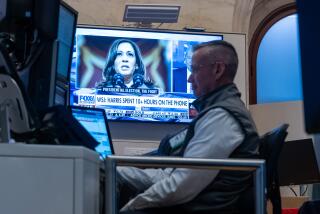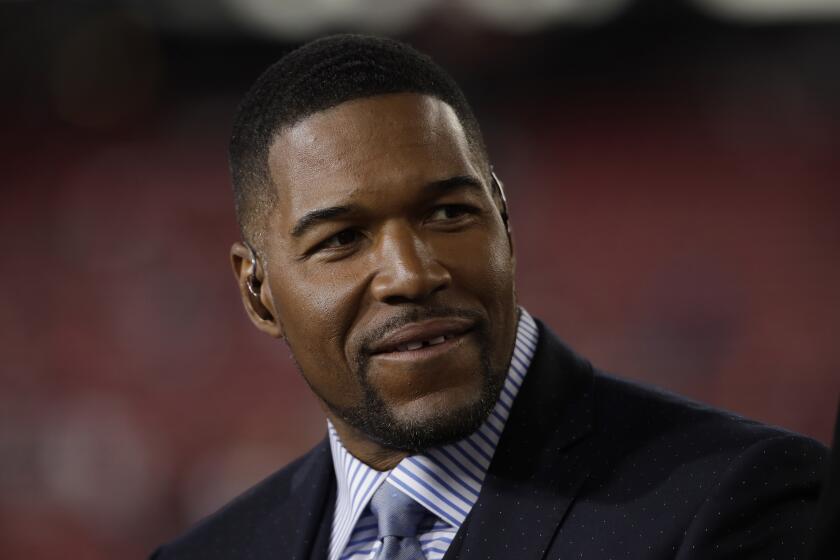The year reality and ‘reality’ fully intertwined
The world, you may have noticed, is in a jumble. Facts are in dispute, even when they have been demonstrated; lies are repeated as truths, even when they have been discredited. It’s reality as reality TV, in this Year of Our Fake News 2017, where nothing is real but anything can be “real.”
Without assigning any specific blame (or credit, if you prefer) to “The Real World,” “Survivor,” “Here Comes Honey Boo Boo,” “Keeping Up With the Kardashians,” “The Real Housewives of [City Name Here]” or any of their innumerable kin, we are living in a world they helped make possible. It’s not just that reality TV gave one of its own to the White House, it’s that in their confounding the invented with the actual, for decades now, such series have conditioned the air we are daily forced to breathe.
FULL COVERAGE: Year-end entertainment 2018 »
Reality television lives in this foggy space. For a reality show to work, the viewer has to believe, on some sub- or semi-conscious level, that what he’s watching is true — a documentary, more or less — even when it is abundantly clear that the “truth” has been massaged, manipulated, time-shifted, cropped, framed and sensationalized. Reading reality TV requires selective attention — or inattention, more to the point. Decades of such series have perhaps taught us too well to forget what we know.
It’s not just the obvious shows, either — the competitions, the “true-life” workplace and domestic comedies, house-hunting shows whose subjects only pretend to house hunt. Cable news borrows much from the reality playbook: tension-inducing sound design, hectoring repetition, orchestrated indignation. Both forms exploit outrage; they reduce complex human behavior to melodrama, making it easier to grasp and harder, in any meaningful way, to understand. They remove context, they turn up the contrast to emphasize the black, the white. They cater to an audience; they prefer breast-beating to calm recitation, opinion to statistics.
What can be done? Cut down on “The Bachelor”? Is this to be our lot forever more? It may be helpful to observe that the culture of alarm is not new to the 21st century — once it only took a newspaper to stir up a fit, even start a war — and that what we have survived before we may survive again. But we have made it more virulent, easier to spread, faster-acting. (Looks upward, shakes fist, growls, “Internet!”)
Television networks once took pains to keep their entertainment and news departments separate, both for journalistic integrity and to preserve the integrity of the brand. But the pie wasn’t sliced so thin in those days. Everyone made money. (Repeats, “Internet!”) It’s all synergy now, reckoned by ratings and clicks; the firewalls are burning. CBS Chairman Les Moonves’ 2016 observation that Trump’s run “might not be good for America, but it’s damn good for CBS” tells that story neatly; perhaps it is one he would like to take back. It might have been the case, but what’s good for CBS is not necessarily good for you.
When nothing can be trusted, anything might be true; and when anything might be true, nothing can be trusted. That the president — for example — relies on the authority of what he thinks he knows, deriding as phony anything that does not fit his preferred, often baseless, narrative is a curious quality in what used to be called the leader of the free world. But this quality is not unique to him. It’s what we all wrestle with whenever we click past something that seems liable to pull us out of our comfort zone, to retreat from the light into the haze.
Television is a great seducer: Americans watch it five hours a day, on average. That is a lot of time — a work week, practically, every seven days! — to lend one’s head to a manufactured reality. It can’t help but have an effect — and TV is not going to go away.
Should you watch less of it? (You should, but that is another essay.) At least, in letting it into your home, remember that this golden age of television owes its reputation to shows whose actuality is not in question — they’re scripted! — but at their best tell you more about the world, more thoughtfully, than much of what purports to be the truth.
It’s up to you, citizen. The price of a free mind is eternal vigilance. Check yourselves. Know fact from fiction in 2018.
Follow Robert Lloyd on Twitter @LATimesTVLloyd
ALSO
When Jimmy mussed Donny and the role of television in Donald Trump’s win
‘UnREAL’ is a splendidly realized drama about reality TV
Envelope Emmy Round Table: Reality hosts get real
More to Read
The complete guide to home viewing
Get Screen Gab for everything about the TV shows and streaming movies everyone’s talking about.
You may occasionally receive promotional content from the Los Angeles Times.







